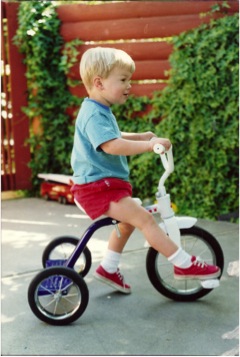By the time my son Matthew was given the official diagnosis of autism at age 5, I already knew. This was almost 22 years ago, and I had only heard the “A” word to describe what Matthew probably wasn’t. Back then, autism was not nearly as prevalent as it is today, and it seemed that nobody wanted to be the messenger. Once the diagnosis was confirmed, it was up to me to figure out who to turn to for help.

Matthew around diagnosis time…
What a difference TWO decades make. Specialists are able to detect the symptoms of autism earlier and earlier, and while it is never the diagnosis that parents want to hear, there are so many resources available now from the very beginning. Here is list of 11 crucial things to help you get started:
1) Allow yourself time to grieve. Don’t let anyone rain on your denial phase. I found that stage to be one of my most productive.
2) Susan Woolner, mother of three boys including twins with autism(I always listen to a mother of twins with autism) recommends Autism Speaks 100 day kit, and the Asperger Syndrome and High Functioning Autism Tool Kit -both were created specifically for newly diagnosed families to make the best possible use of the 100 days following their child’s diagnosis of autism or AS/HFA.I wholeheartedly agree. Autism Speaks has one of the best resource guides ever.I’m also very impressed with myautismteam.com, a social network for parents of children with autism that has partnered with Autism Speaks. The Autism Society of America’s resource guide is also excellent. But one my most recommended resource guides comes from The Thinking Person’s Guide to Autism.
Speaking of THE THINKING PERSON’S GUIDE TO AUTISM, spend some time with their blog, and check out their book . There you will find great info from smart people just like you that you can trust.
3) Meet other parents and build community with them. Also, seek out parents who are “veterans” in the ASD journey. The benefits of being with other people who “get it” cannot be explained in words.
4) Educate yourself on your state law and school district policies. You are the best advocate for your child. Remember that they are children first and that they just happen to have autism.
5) Don’t blame yourself or your spouse.

Me and my spouse. I don’t really blame him…
6) Pick your battles. You already know that by now.
7) I am not an organized person, but I have learned that the best thing is to have some kind of a schedule each day so that your child knows what to expect. I am also not a tidy person, but have learned that clearing the clutter in the house helps. Think about how calm you feel when you walk into a staged home.

Not what my house looks like
8) The internet can make you crazy! You will find a lot of support, but you can also find a lot of false promises.
9) Pray for patience. Patience helps a lot.
10) Even though you will occasionally feel like you’re losing your mind, do your best to keep your sense of humor. Autism itself is not funny but it DOES create some situations that are.
11) Don’t forget the other siblings. Move heaven and earth to give them the love and attention that they need.

Brothers
12)”No matter the level of his or her challenges,” says’s Lindsey Nebeker, a pianist/songwriter and autism advocate who herself is on the autism spectrum, “your child has a place in this world. Your child has a voice.”
I am open to more pointers if you would like to share some.
One more thing. Need to vent? Want some help? Contact me here and I will do my best to help.
…
Read the first three chapters of Laura’s book here.
You will be hooked.
(don’t you love it when people talk about themselves in third person?)